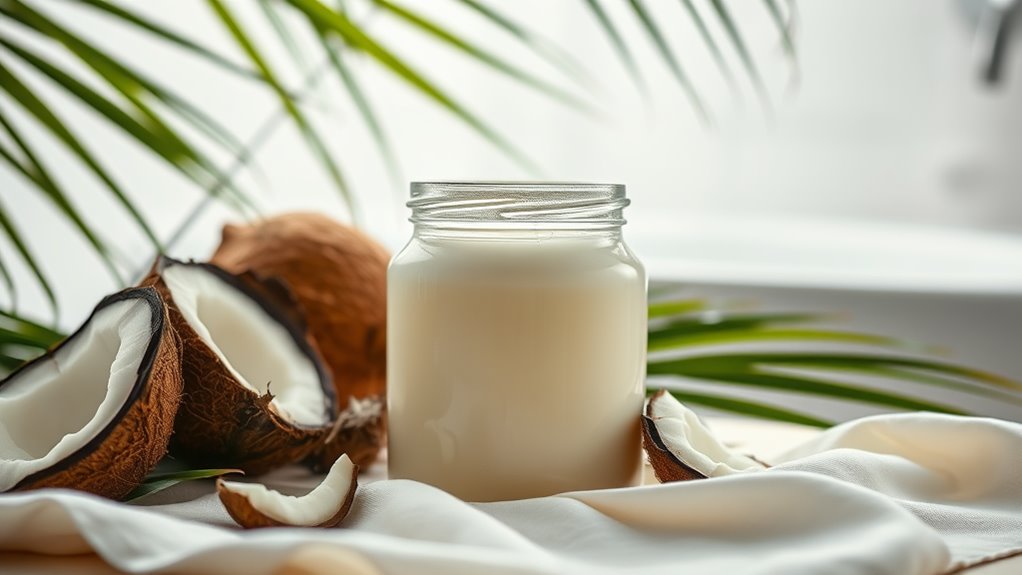Coconut Oil Uses for Healthy and Beautiful Skin
Coconut oil is a powerhouse for maintaining healthy, beautiful skin. It’s a natural moisturizer that enhances skin elasticity and combats dryness, thanks to its rich medium-chain fatty acids. You can use it as an effective makeup remover, dissolving stubborn makeup without harsh chemicals. If you struggle with acne, its antibacterial properties may help prevent breakouts while soothing irritation. Additionally, it offers relief for sunburn with its anti-inflammatory benefits. By incorporating coconut oil into your routine, you promote hydration and balance. You’ll find even more ways to optimize your skincare by exploring further.
Key Takeaways
- Coconut oil enhances skin elasticity and promotes collagen production, leading to firmer and more youthful-looking skin.
- It effectively removes makeup and cleanses the skin without harsh chemicals, maintaining moisture balance.
- Rich in lauric acid, coconut oil provides anti-inflammatory and antibacterial properties, helping to soothe acne and prevent breakouts.
- Applying coconut oil on damp skin locks in hydration and creates a protective barrier against environmental stressors.
- Its emollient properties make it ideal for dry and normal skin types, promoting overall skin health and radiance.
Benefits of Coconut Oil
Coconut oil offers numerous benefits for skin health, making it a popular choice in both skincare routines and natural remedies. One of the key advantages of using coconut oil is its positive impact on skin elasticity. As you age, your skin naturally loses elasticity, leading to sagging and wrinkles. Incorporating coconut oil into your daily regimen can help combat these effects.
Coconut oil is rich in medium-chain fatty acids, particularly lauric acid, which possesses anti-inflammatory and antioxidant properties. These components work synergistically to improve skin elasticity by promoting collagen production. When you apply coconut oil, it penetrates deeply into the skin, providing essential hydration and nourishment.
Additionally, the oil’s emollient properties create a protective barrier that locks in moisture, further enhancing skin suppleness. This barrier also aids in shielding your skin from environmental stressors that can contribute to loss of elasticity.
Regular use of coconut oil can lead to visibly firmer skin, reducing the appearance of fine lines and wrinkles.
Incorporating coconut oil into your skincare routine not only enhances skin elasticity but also fosters a healthy, radiant complexion that reflects your overall skin health.
Natural Moisturizer
Coconut oil acts as an effective natural moisturizer, offering deep hydration benefits that can considerably enhance your skin’s texture.
By understanding the best application techniques, you can maximize its efficacy for various skin types.
This knowledge enables you to tailor your skincare routine for ideal results.
Deep Hydration Benefits
A natural moisturizer like coconut oil offers profound hydration benefits for your skin. The unique composition of coconut oil, particularly its medium-chain fatty acids, penetrates deeply into the skin, enhancing moisture retention. This not only hydrates your skin but also strengthens the skin barrier, which is essential for preventing moisture loss and protecting against environmental aggressors.
Incorporating coconut oil into your hydration routine can yield noticeable improvements in skin texture and elasticity. Its emollient properties allow it to form a protective layer that locks in hydration, making it particularly beneficial for individuals with dry or sensitive skin. This barrier helps to reduce transepidermal water loss, ensuring that your skin remains plump and supple throughout the day.
Moreover, coconut oil contains antioxidants that help combat oxidative stress, further supporting skin health. By regularly using coconut oil, you can promote a balanced hydration level, resulting in a more radiant complexion.
To maximize these benefits, consider integrating coconut oil into your daily skincare regimen, allowing your skin to experience the deep hydration it craves. Embrace the power of coconut oil and enjoy the lasting benefits it brings to your skin health.
Application Techniques
When incorporating coconut oil into your skincare routine as a natural moisturizer, the application technique plays a significant role in maximizing its benefits.
To start, verify your skin is clean and slightly damp. This helps lock in moisture more effectively. Take a small amount of coconut oil, about a dime-sized portion, and warm it between your palms. This warming process enhances absorption and spreads the oil more evenly.
Next, apply the oil using gentle, upward strokes, focusing on areas that tend to be drier. For best results, consider layering products. If you use other skincare items, such as serums or toners, apply those first.
Coconut oil acts as an occlusive agent, sealing in moisture, so it should typically be the last step in your routine. If you’re using it during the day, remember to allow the oil to absorb fully before applying makeup.
For nighttime application, you can be more generous, as the oil will nourish your skin while you sleep. By mastering these application techniques, you’ll harness the full moisturizing potential of coconut oil, promoting healthier, more radiant skin.
Suitable Skin Types
Recognizing your skin type is essential for effectively using coconut oil as a natural moisturizer.
Coconut oil is particularly beneficial for dry and normal skin due to its emollient properties, which help lock in moisture and create a protective barrier. However, if you have oily skin, be cautious. While coconut oil can provide hydration, it may exacerbate oiliness or clog pores, potentially leading to breakouts. If you choose to use it, opt for a fractionated version, which is lighter and less comedogenic.
For those with sensitive skin, coconut oil can be soothing, thanks to its anti-inflammatory properties.
It’s vital to perform a patch test before full application, as individual reactions can vary. If irritation occurs, discontinue use and consult a dermatologist.
Effective Makeup Remover
Coconut oil effortlessly dissolves even the most stubborn makeup, making it an excellent choice for your skincare routine. Its unique chemical composition, rich in medium-chain fatty acids, allows it to penetrate the skin and break down makeup effectively.
Whether you’re dealing with waterproof mascara, long-lasting foundation, or heavy eyeliner, coconut oil guarantees thorough makeup removal without harsh chemicals.
To use coconut oil for makeup removal, simply warm a small amount between your palms and gently massage it onto your face. The oil binds with the makeup, lifting it away from your skin.
Follow this with a soft cloth or cotton pad to wipe away the residue. This not only cleanses your skin but also nourishes it, leaving you with a fresh, hydrated complexion.
Furthermore, coconut oil has antibacterial properties that can help prevent breakouts, making it a dual-action product for those concerned about skin health.
Unlike traditional makeup removers that can strip your skin of its natural oils, coconut oil maintains your skin’s moisture balance while effectively removing makeup.
Incorporating coconut oil into your makeup removal routine can enhance your overall skincare regimen.
Remedy for Dry Skin
For those struggling with dry skin, coconut oil serves as a potent remedy due to its deep moisturizing properties. Its unique composition, rich in medium-chain fatty acids, allows it to penetrate the skin barrier effectively, providing hydration where it’s needed most.
By forming a protective layer on the skin, coconut oil helps to lock in moisture and prevent transepidermal water loss, making it particularly beneficial during periods of seasonal dryness.
When you apply coconut oil, it not only hydrates but also nourishes the skin, promoting overall skin health. Its anti-inflammatory properties can soothe irritated skin, making it an excellent choice for those suffering from conditions like eczema or psoriasis.
Additionally, coconut oil’s natural antioxidants combat free radical damage, further supporting skin integrity.
To use coconut oil effectively, warm a small amount in your hands and gently massage it into your skin after cleansing. This practice not only enhances absorption but also boosts circulation.
Incorporating coconut oil into your daily skincare routine can greatly improve your skin’s texture and resilience, helping you achieve a soft, radiant complexion even in harsh weather conditions.
Treatment for Acne
Coconut oil’s antimicrobial properties make it a promising treatment for acne, as it can help reduce the bacteria responsible for breakouts.
Additionally, its moisturizing benefits can prevent the skin from over-drying, which often exacerbates acne.
You can apply coconut oil directly to affected areas or mix it with other natural ingredients for enhanced effects.
Antimicrobial Properties Explained
When it comes to treating acne, the antimicrobial properties of coconut oil play a crucial role in combating the bacteria responsible for breakouts. The unique composition of coconut oil, particularly its medium-chain fatty acids, exhibits significant antimicrobial effects, making it an effective natural remedy.
By targeting the bacteria that cause skin infections, coconut oil helps to reduce inflammation and promote clearer skin.
Here are four key benefits of using coconut oil for acne treatment:
-
Reduces Bacterial Growth*: The *lauric acid in coconut oil is known for its ability to inhibit the growth of acne-causing bacteria, reducing the likelihood of breakouts.
-
Soothes Inflammation: Coconut oil’s anti-inflammatory properties can help calm irritated skin, providing relief from redness and swelling associated with acne.
-
Promotes Healing: With its antimicrobial effects, coconut oil aids in healing existing acne lesions and preventing further skin infections.
-
Balances Skin: Coconut oil helps maintain your skin’s natural moisture balance, making it less prone to dryness and irritation that can exacerbate acne.
Incorporating coconut oil into your skincare routine can be a beneficial step towards clearer, healthier skin.
Moisturizing Benefits Highlighted
Many people overlook the importance of proper hydration in acne treatment, yet maintaining adequate moisture levels in the skin is essential for preventing breakouts. When your skin is well-hydrated, it can support its natural barrier function, which plays a critical role in protecting against irritants and bacteria.
Coconut oil’s unique composition makes it an excellent choice for promoting skin hydration and moisture retention. Coconut oil contains medium-chain fatty acids that penetrate the skin efficiently, locking in moisture and preventing trans-epidermal water loss.
By incorporating coconut oil into your skincare routine, you help your skin retain moisture, which can reduce the overproduction of sebum that often leads to acne. When skin is adequately moisturized, it’s less likely to become inflamed or irritated, further decreasing the risk of breakouts.
Moreover, the non-comedogenic properties of coconut oil mean it won’t clog pores, making it suitable for acne-prone skin. It can also soothe redness and irritation associated with acne lesions.
To summarize, prioritizing skin hydration through coconut oil can be a strategic approach to managing acne and achieving healthier skin.
Application Methods Suggested
Effective application methods can considerably enhance the benefits of coconut oil in treating acne. By employing specific techniques, you can maximize its antibacterial properties and promote skin healing. Here are some suggested methods to contemplate:
-
Direct Application: Use a clean fingertip or cotton swab to apply a small amount of coconut oil directly onto the affected areas. This targeted method allows for concentrated treatment.
-
Layering Techniques: Combine coconut oil with other acne-fighting ingredients, such as tea tree oil or aloe vera. Apply the coconut oil first and let it absorb before layering the other products on top.
-
Application Frequency: Start with applying coconut oil twice daily—once in the morning and once before bed. Adjust frequency based on your skin’s response; you may find that once daily suffices.
-
Overnight Treatment: For more stubborn acne, contemplate using coconut oil as an overnight treatment. Apply a thin layer before bed and wash it off in the morning to reduce inflammation and promote healing.
Soothing for Sunburns
Sunburn can leave your skin feeling hot, painful, and irritated. Fortunately, coconut oil offers impressive sunburn relief due to its cooling properties and nourishing components. When applied to sunburnt skin, coconut oil helps soothe the inflammation through its high levels of fatty acids, which promote healing and hydration.
The medium-chain fatty acids in coconut oil, particularly lauric acid, have anti-inflammatory and antimicrobial effects. These properties can assist in reducing redness and swelling associated with sunburn. Additionally, the oil creates a barrier, locking in moisture and preventing further dehydration of damaged skin.
To use coconut oil for sunburn relief, wait until your skin cools down slightly. Gently apply a thin layer of the oil to the affected area, allowing it to absorb. This not only provides immediate cooling relief but also promotes skin regeneration over time.
Remember that while coconut oil is beneficial, it’s important to avoid applying it to broken skin or severe burns. For peak recovery, combine coconut oil use with other sunburn remedies, such as staying hydrated and seeking shade.
Frequently Asked Questions
Can Coconut Oil Cause Allergic Reactions on Sensitive Skin?
Yes, coconut oil can cause allergic reactions in those with skin sensitivity. If you experience allergy symptoms like redness, itching, or swelling after application, it’s best to discontinue use and consult a healthcare professional.
Is It Safe to Use Coconut Oil on Oily Skin?
Using coconut oil on oily skin can be safe, as it offers numerous benefits like hydration and antibacterial properties. However, individual reactions vary, so monitor your skin’s response to prevent potential breakouts or irritation.
How Should Coconut Oil Be Stored for Longevity?
To store coconut oil for longevity, use airtight storage containers, keeping it in a cool, dark place. This method extends its shelf life, preventing oxidation and rancidity, ensuring you maintain its quality over time.
Can Coconut Oil Be Used as a Hair Treatment?
Yes, you can use coconut oil as a hair treatment. It promotes hair nourishment and enhances scalp health, reducing dryness and flakiness. Regular application can lead to stronger, shinier hair, improving overall hair health.
What Is the Best Type of Coconut Oil for Skincare?
For skincare, virgin coconut oil’s unrefined nature retains nutrients and antioxidants, making it ideal. Refined coconut oil, while more stable, loses some benefits. You should choose virgin coconut oil for peak skin health and nourishment.





